Opposition parties today walked out of the venue where results from Nigeria’s tightly contested presidential elections are being announced, the BBC reports:
The main opposition Peoples Democratic Party (PDP) and the Labour Party have claimed there is a lack of transparency with the new electronic voter system. This is the first national election where an electronic device has been used to accredit voters. The election commission has denied the opposition parties’ complaints.
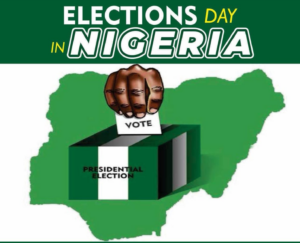 Nigerian civil society groups also, criticized the INEC, saying that its officials had arrived late in a few states and that the biometric accreditation system that uses fingerprints and facial recognition had not worked as intended in some cases, The FT reports:
Nigerian civil society groups also, criticized the INEC, saying that its officials had arrived late in a few states and that the biometric accreditation system that uses fingerprints and facial recognition had not worked as intended in some cases, The FT reports:
Cheta Nwanze, a partner at the Lagos-based consultancy SBM Intelligence, which deployed researchers across the country over the weekend, said the INEC was institutionally slow, which could mean the legitimacy of the results would be challenged by whoever wins.
“The INEC’s poor handling of logistics and even poorer communication with voters mean that many Nigerians who went to their polling units on Saturday and Sunday were operationally disenfranchised,” he said.
Still, the issues prompted suspicions among many Nigerians who have experienced tampered votes in the past, The Wall Street Journal reports.
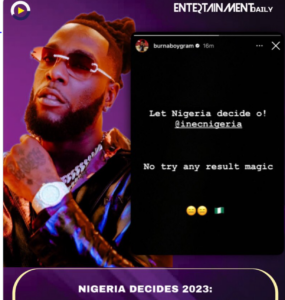 “Let Nigeria decide o!” Afrobeats star Burna Boy (right) said in a message posted on Instagram on Sunday that tagged the electoral commission. “No try any results magic.”
“Let Nigeria decide o!” Afrobeats star Burna Boy (right) said in a message posted on Instagram on Sunday that tagged the electoral commission. “No try any results magic.”
Yiaga Africa, a non-profit civic group and NED partner, says it deployed 3,836 observers across the country and was disappointed with the election process. “There’s a sense of disappointment, quite frankly, with the way this process has gone. Clearly, we’ve not overcome and resolved, our perennially logistical challenges with elections,” Samson Itodo, Yiaga’s Executive Director told CNN.
The election “fell well short of citizens’ reasonable expectations”, while the electoral commission lacked transparency, said the International Republican Institute (IRI) and National Democratic Institute (NDI) Joint Election Observation Mission (IEOM).
Logistical challenges and multiple incidents of political violence overshadowed the electoral process and impeded a substantial number of voters from participating, said the mission leader Dr. Joyce Banda, former President of Malawi, who today presented its preliminary statement about the February 25 presidential and National Assembly elections.
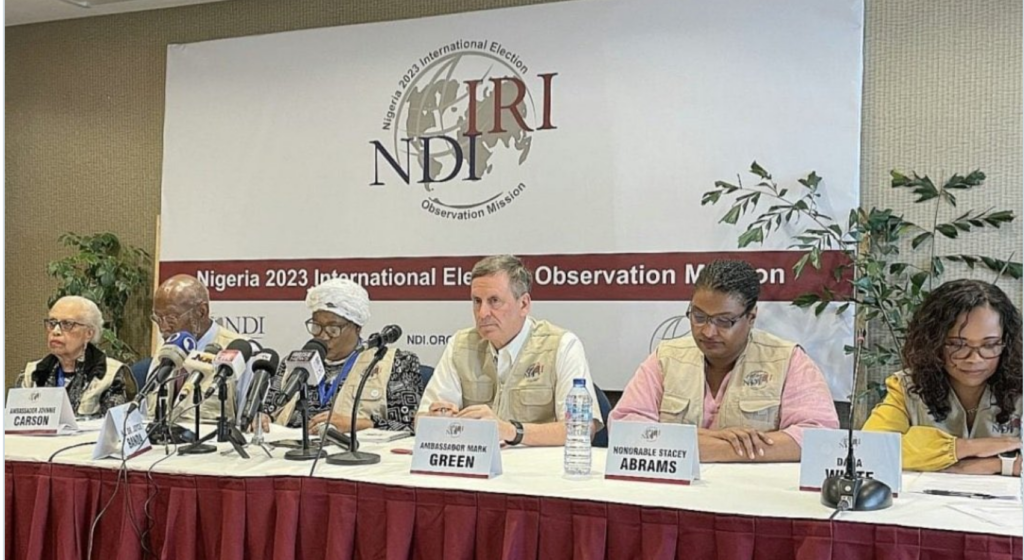
Credit: IRI/NDI Twitter
Currency and fuel shortages imposed excessive burdens on voters and election officials while marginalized groups, especially women, continue to face barriers to seeking and obtaining political office, she added (above). The late opening of polling locations and logistical failures created tensions and the secrecy of the ballot was compromised in some polling units given overcrowding.
Disenfranchised voters
Banda said after the polls, challenges with the electronic transfer of results and their upload to a public portal in a timely manner, undermined citizen confidence at a crucial moment of the process. “Inadequate communication and lack of transparency by the Independent National Electoral Commission (INEC) about their cause and extent created confusion and eroded voters’ trust in the process. “The combined effect of these problems disenfranchised Nigerian voters in many areas, although the scope and scale is currently unknown,” the ex-President added.
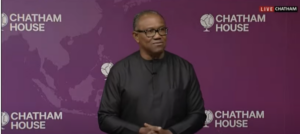 Despite his wealth and government experience, Obi (right) does represent a break from entrenched political networks and has a reputation for competence and transparency. “He hasn’t been part of the ‘godfather’ political stereotype that we see with Bola Tinubu or Atiku Abubakar,” Joseph Siegle, director of research at the Africa Center for Strategic Studies, told Vox in an interview.
Despite his wealth and government experience, Obi (right) does represent a break from entrenched political networks and has a reputation for competence and transparency. “He hasn’t been part of the ‘godfather’ political stereotype that we see with Bola Tinubu or Atiku Abubakar,” Joseph Siegle, director of research at the Africa Center for Strategic Studies, told Vox in an interview.
A successful election in Nigeria “opens the door for democratic self-correction,” Siegle said, allowing for a government responsive to people’s needs and capable of growth and flexibility in the face of great change across the nation, the continent, and the world. “It’s a big deal,” he said. “It would make a huge statement for Nigeria and for Africa; with Nigeria being Africa’s largest population and largest economy, that’s a big deal.”
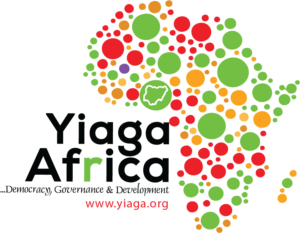 The 2023 presidential election will help shape the path to social reconstruction or create the conditions for a descent into chaos. As Damon Wilson, president of the National Endowment for Democracy (NED), noted, transformation in Nigeria “matters and can have a real impact on the development of democracy in West Africa, across Africa, and around the world”.
The 2023 presidential election will help shape the path to social reconstruction or create the conditions for a descent into chaos. As Damon Wilson, president of the National Endowment for Democracy (NED), noted, transformation in Nigeria “matters and can have a real impact on the development of democracy in West Africa, across Africa, and around the world”.
During a recent trip to Nigeria, Wilson witnessed how international support is enabling civic actors like Yiaga Africa to coordinate a massive national effort to monitor elections, he writes for TIME.
#NigeriaDecides: Labour Party Seeks Results Cancellation In Rivers, #NigeriaDecides https://t.co/u3AET2J9U8
— Naija News (@NaijaNews) February 26, 2023







